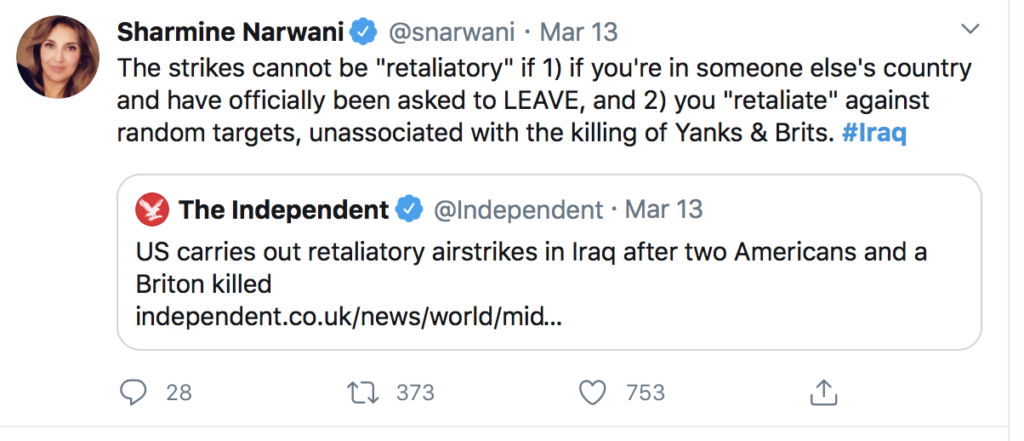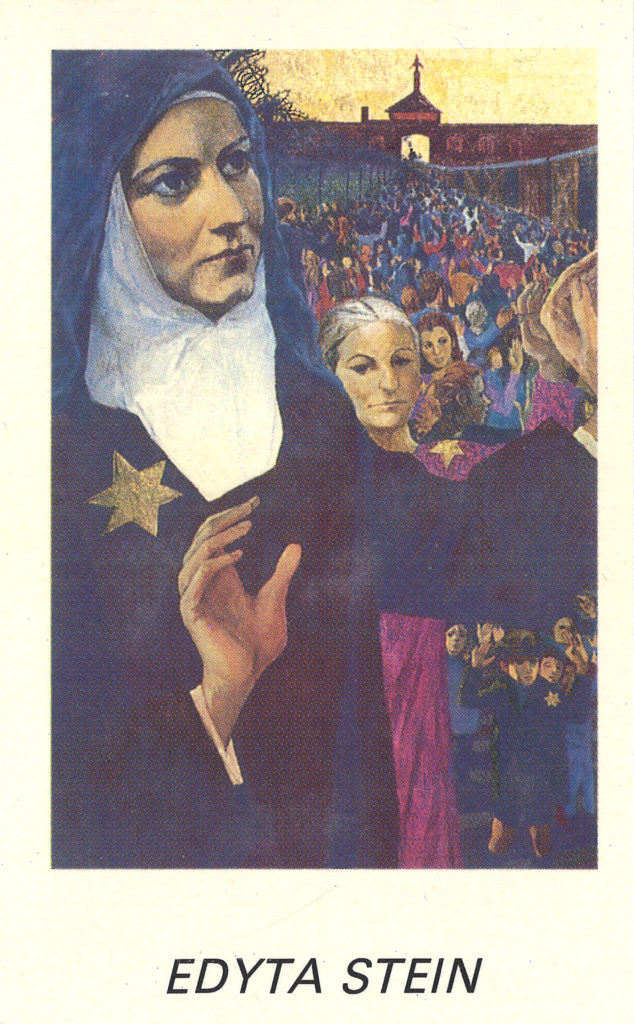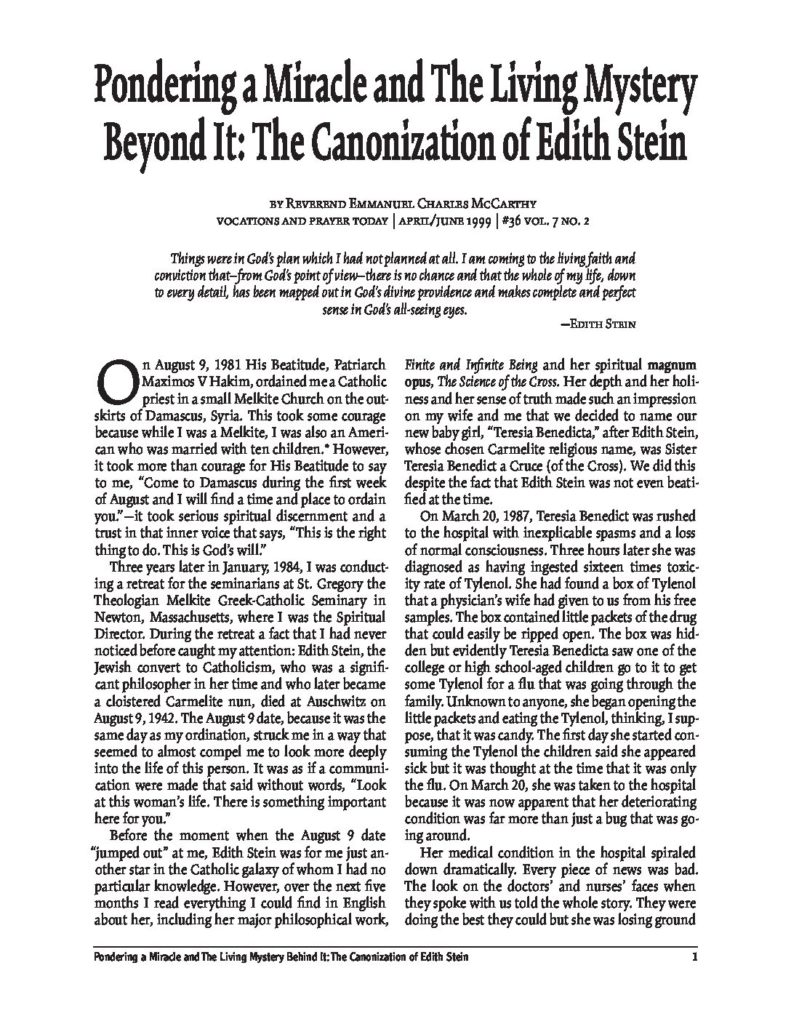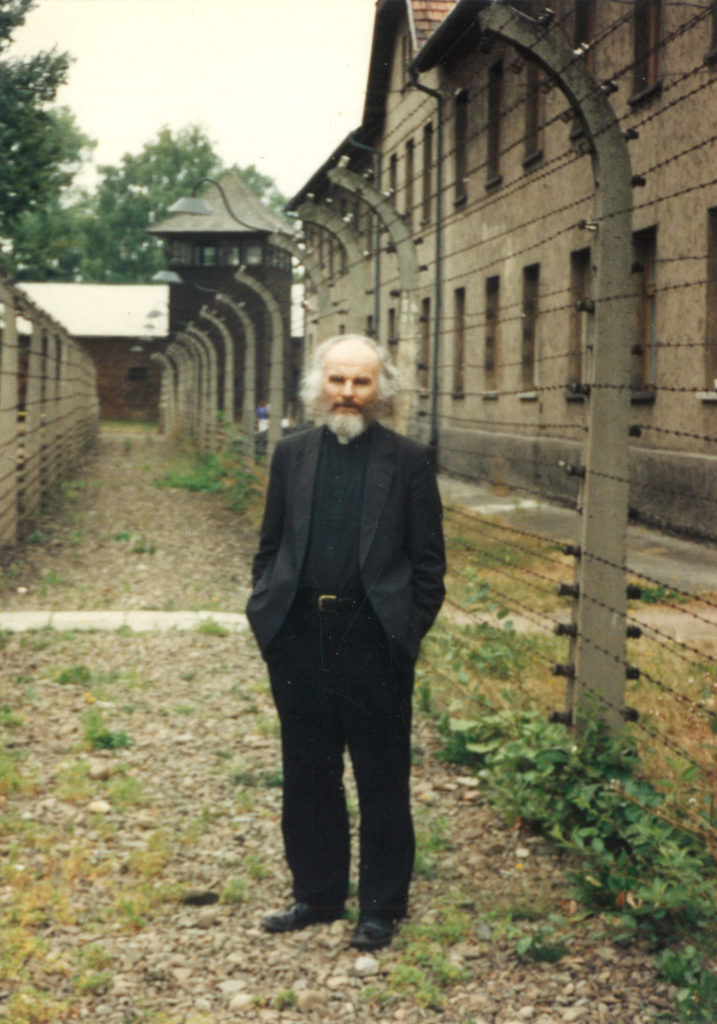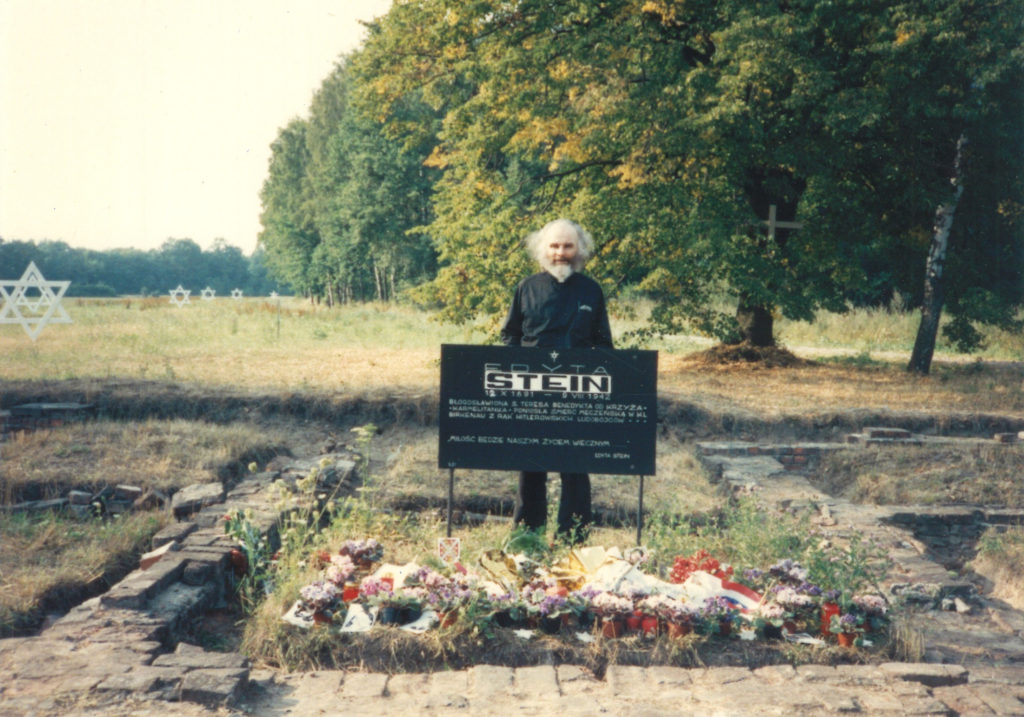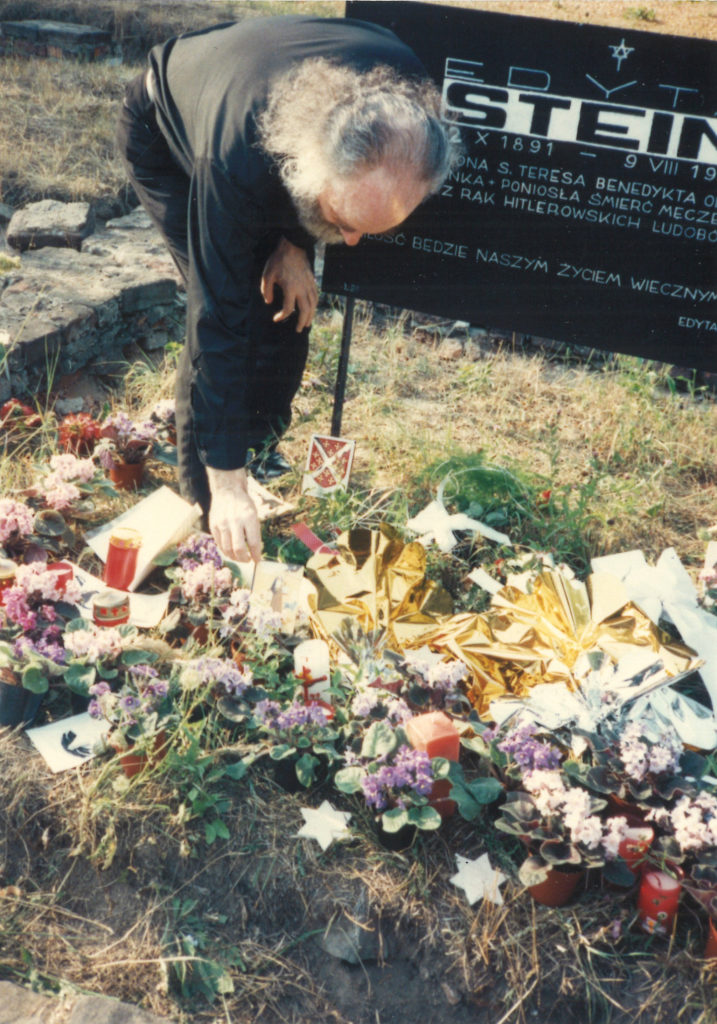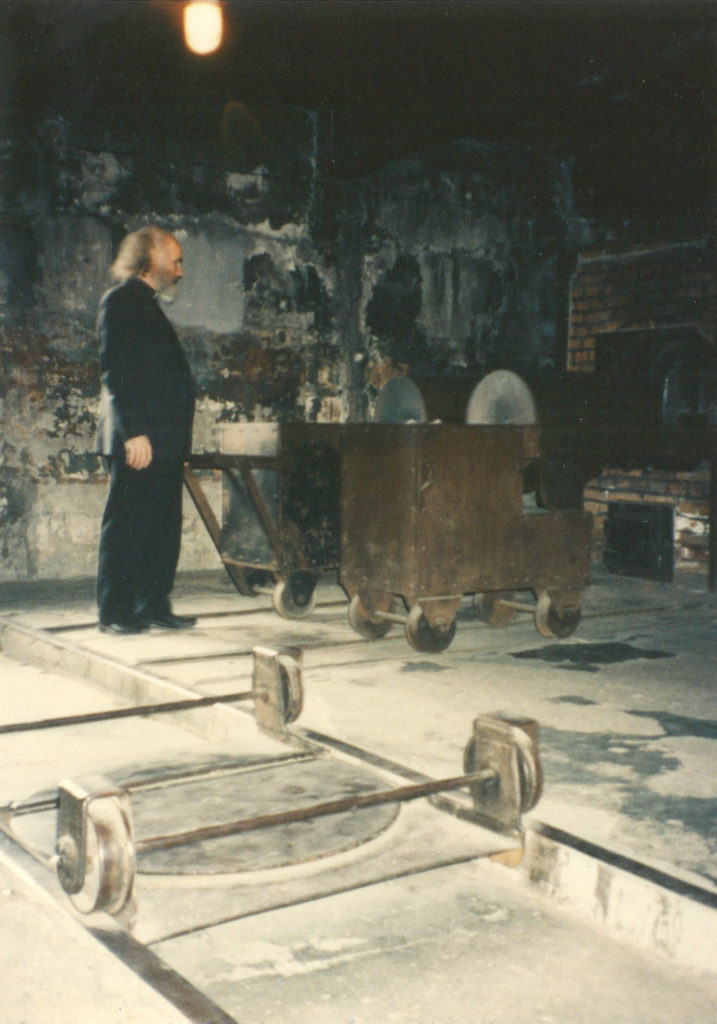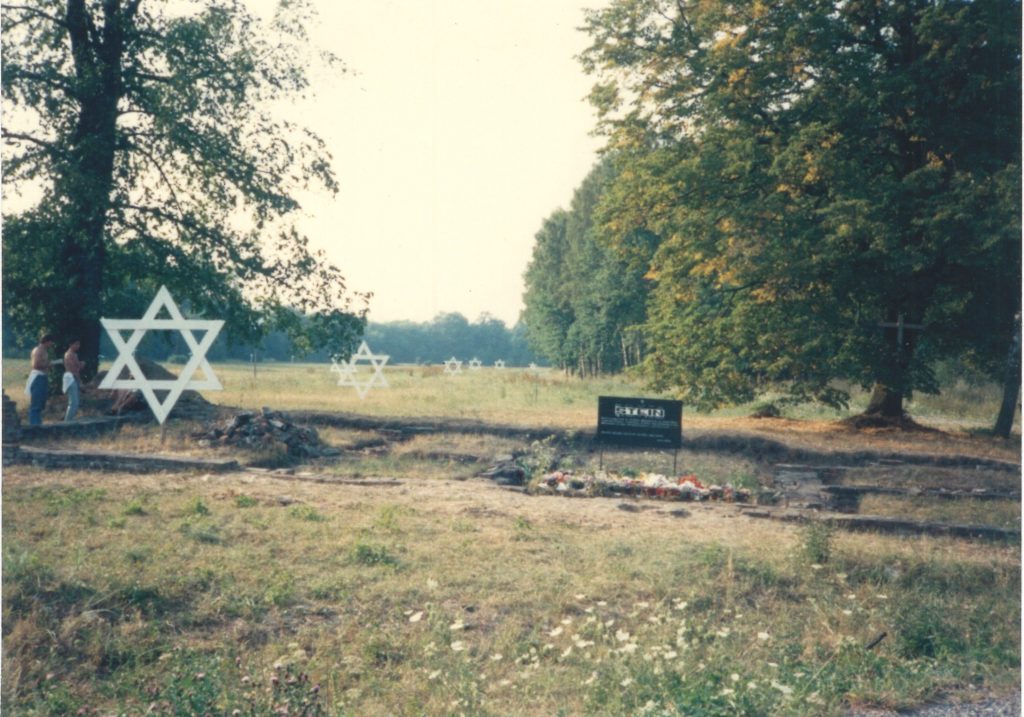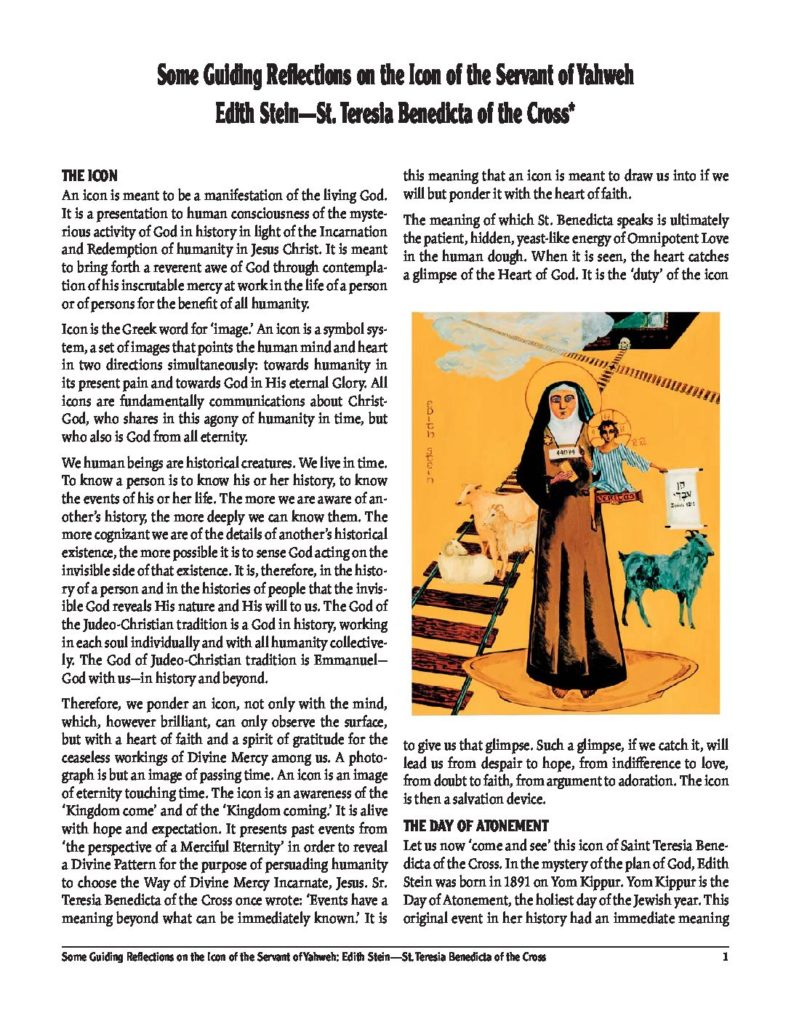Thoughts on conscientious objection and the new film “A Hidden Life”
by Ellen Finnigan
This article was first published at LewRockwell.com.
On November 24 I gave a presentation in the basement of my church in Colorado about two Catholic conscientious objectors. The first was Blessed Franz Jägerstätter, an Austrian farmer, husband, and father who refused to fight for Hitler during World War II. I was hoping that his witness, memorialized in the upcoming film by Terrence Malick, might be a stepping stone for people to consider the life of Ben Salmon, a Catholic man from Denver who refused to fight in World War I. Jägerstätter has been declared a martyr and “Blessed” in the Catholic Church, which is one step away from being canonized, or declared a saint, and some of us are trying to put Ben Salmon on that same path. President Kennedy once wrote: “War will exist until that distant day when the conscientious objector enjoys the same reputation and prestige as the warrior does today.” By spreading the word about the film A Hidden Life and advocating for Ben Salmon’s cause for sainthood, some American Catholics are trying to bring that day a bit closer. (In case you don’t make it to the end of the article, you can help us by going here, reading about Ben Salmon’s life, and signing the petition!)
Christ the King
November 24 happened to be the Feast of Christ the King. I was hoping that the priest’s homily would be a good primer for my presentation, pointing out the differences between that which we associate with worldly kingship — wealth, war, servants, subjects, thrones, political power, military might — and the kingship of Christ, the Prince of Peace, who was born in a manger, raised in nowhere Nazareth, rode into Jerusalem on an ass and came to serve rather than to be served. The two kingdoms are not necessarily opposed. As Pope Pius XI writes in his encyclical Quas Primas: “[Christ’s] kingdom is opposed to none other than to that of Satan and to the power of darkness.” But the Feast Day of Holy Innocents which takes place a few days after Christmas reminds us that they can be opposed and, I would add, most often are: “Then Herod, when he saw that he had been tricked by the Wise Men, was in a furious rage, and he sent and killed all the male children in Bethlehem and in all that region who were two years old or under…” (Mt 2:16).
Worldly kingdoms are founded on violence. They are obsessed with counting, spying, surveilling, and keeping track. They demand, for example, that their subjects be accounted for in censuses so that they can tax them or draft them to fight in wars, even if this means a very pregnant woman must ride for for days on a donkey along dangerous, bandit-ridden roads to report to her Roman overlords. The state assumes the power to threaten, intimidate, imprison, torture, bomb, electrocute, assassinate, poison, and in the case of Franz Jägerstätter”, gruesomely behead. In contrast, Cyril of Alexandria writes: “Christ has dominion over all creatures, a dominion not seized by violence nor usurped, but his by essence and by nature.” The Kingdom of Heaven is founded on love. Jesus assures us: “Even the hairs of your head have all been counted” (Lk 12:7). You see God counts too, but not in the same way or for the same purposes.
The feast day of Christ the King was established only relatively recently, in 1925. World War I had ended seven years before and was called “the war to end all wars,” but of course it only planted the seeds for the next one. Franz Jägerstätter had lost his biological father in the Great War. Though he had always had an interest in spiritual reading, he wasn’t yet any kind of Christian radical. In 1925, he was just a seventeen-year-old kid who would soon be working in the mines and earning a badge of honor by being the first person in his village to own a motorcycle.
In his encyclical of 1925, Pope Pius XI reminds us that the establishment of a new feast day isn’t random but has something to do with the state of the world. At that time nationalism and secularism were on the rise. He writes: “The empire of Christ over all nations was rejected…the religion of Christ came to be likened to false religions…It was then put under the power of the state and tolerated more or less at the whim of princes and rulers. Some men went even further, and wished to set up in the place of God’s religion a natural religion…There were even some nations who thought they could dispense with God…The rebellion of individuals and states against the authority of Christ has produced deplorable consequences.”
He was writing all of this in the year after Lenin died and Stalin came to power, the year Hitler published the first volume of Mein Kampf, and the yearMussolini gave a speech marking the beginning of his dictatorship. Who could have guessed that the kid riding on his motorcycle in the middle of the mountains of nowhere Austria would turn out to be the kind of Catholic the Pope hoped to see, one who, without “station” or “authority” would nonetheless “bear the torch of truth”. He writes:
We firmly hope…that the feast of the Kingship of Christ, which in future will be yearly observed, may hasten the return of society to our loving Savior. It would be the duty of Catholics to do all they can to bring about this happy result. Many of these, however, have neither the station in society nor the authority which should belong to those who bear the torch of truth.This state of things may perhaps be attributed to a certain slowness and timidity in good people, who are reluctant to engage in conflict or oppose but a weak resistance; thus the enemies of the Church become bolder in their attacks. But if the faithful were generally to understand that it behooves them ever to fight courageously under the banner of Christ their King, then, fired with apostolic zeal, they would strive to win over to their Lord those hearts that are bitter and estranged from him, and would valiantly defend his rights.
By 1938, when Germany began the annexation of Austria, Franz had inherited a farm and married a devout Catholic, with whom he’d have three children, and largely because of her influence, he studied the Bible and became active in his village parish. When he was drafted in 1940, he did report to his Nazi overlords and went through six months of military training. That same year he became a member of the Third Order of Saint Francis. In the years following he would no longer cooperate with Hitler and his troops in any fashion. He would not swear an oath to Hitler, nor would he opt for some form of alternative service, such as working in a hospital. In his decision to refuse cooperation with what he believed to be evil, he was not supported by country, community, or church.
Things Hidden
Standing at the lectern after Mass, I asked how many people had ever heard of Franz. Only one person out of about three hundred raised his hand. This is one reason why Terrence Malick’s film is called A Hidden Life.
“Set your mind on the things above, not on the things that are on the earth, for you have died, and your life is hidden with Christ in God, and when Christ, who is our life, is revealed, then you also will be revealed with Him in glory” (Col 3:2-4).
For a long time nobody knew about the heroic resistance of Franz. He was a source of shame to many of those who did.We must ask: Why is Franz still mostly unknown, especially among Catholics, when his story has been out there for decades? Gordon Zahn discovered the story and wrote a book about him called “In Solitary Witness” in 1964. In 1968 Thomas Merton wrote a chapter about him in Faith and Violence, the last book to bepublished before his mysterious death (allegedly by electrocution). Daniel Ellsberg said it was Franz Jägerstätter who inspired him to release the Pentagon papers. (You can hear more about this in an episode of my podcast called “A Friend of Franz and Ben.”) In 1971 the Austrian government produced a film about Franz called The Refusal, which aired on Austrian television. It’s been over thirteen years since Franz was declared a martyr and beatified.
Granted, there are a lot of saints out there, new ones being canonized all the time, but one would think that in an age when Adolf Hitler has become the “super villain” of the twentieth century, when the History Channel runs an almost continuous stream of content elucidating the sinister activities of the Third Reich, when any suggestion that Christians might be called to be peacemakers instead wagers-of-war is met with the inevitable question “What about Hitler?”, we might have heard something about one of the few Christians who actively resisted him, who was willing to pay the price, the price Jesus said His followers would have to pay. But most of us haven’t. So I didn’t bother asking my parish whether anyone had heard of Ben Salmon. I invited people down for the presentation and yes, coffee and donuts.
A Hidden Life is a stunningly beautiful achievement, one of those films that paralyzes you. When it’s over, you sit there immersed in the music until the last credit has rolled, the lights have been turned on, and a teenager is standing in back with a broom waiting for you to leave. When I left, the manager asked me if I was alright. I nodded and slipped into the restroom. Mascara: everywhere. A woman who also appeared raccoon-like whispered: “That is a movie you never forget.”
“Indeed,” I thought as I blinked my way out into the cold, disoriented. It was like trying to find my car at the airport after a long trip. I had parked so very long ago.
On the drive home I thought about that kid with the broom, no different essentially from Franz. Will he ride home on his new motorcycle or in his new car with his windows rolled down, loving the feeling of driving at night with nobody on the road? Will he fall in love, get married? What will he do when he turns 18 and has to sign up for the Selective Service? What about when (not if) the wagers-of-war decide to launch the next one, which might be happening as I write this essay, against Iran? Does he go to church? Would his church even talk about the war and any moral dilemma it might pose to Christians or would they just applaud vaguely “all those in uniform” and send them on their way — to kill, to die? Would anyone tell him he could say “no”? Would anyone understand if he did?
Sometimes I think we prefer to attribute the support of Hitler among Christians of that time to, in the words of Pope Pius XI,“a certain slowness and timidity in good people, who are reluctant to engage in conflict.” We assume they must have been ignorant of what was happening or maybe, if they did see the powers of darkness at play, they were simply too weak or fearful to stand up to it. God have mercy on them. But Thomas Merton, in his essay on Franz, presents us with another way of understanding the people of that time:
“[Franz’s] Austrian Catholic friends understood that he was unwilling to fight for Hitler’s Germany, but they argued that the war was justified because they hoped it would lead to the destruction of Bolshevism and therefore to the preservation of ‘European Christianity.’ He was therefore refusing to defend his faith.”
What if the Christians in that time and place, instead of being fearful or weak, when they took the oath, trained and enlisted, believed themselves to be, in the words of Pope Pius XI, “fighting courageously under the banner of Christ their King,” “fired with apostolic zeal,” “valiantly defending His rights”?
How many Christians before Hitler or since then have fought in wars waged by worldly kings because they thought it was justified if it would lead to the defeat of some “-ism,” or because they thought they were fighting the enemies of the Church, or preserving Christianity?
What happened to the priests in Hitler’s Germany? How many Christians existed in the Middle East before September 11, 2001? How many exist there now?
Pope Benedict XVI writes in his book Jesus of Nazareth about Christ’s third temptation: “…throughout history [the third temptation] is constantly taking on new forms. The Christian empire attempted at an early stage to use the faith in order to cement political unity. The Kingdom of Christ was now expected to take the form of a political kingdom and its splendor. The powerlessness of faith, the earthly powerlessness of Jesus Christ, was to be given the helping hand of political and military might. This temptation to use power to secure the faith has arisen again and again in varied forms throughout the centuries, and again and again faith has risked being suffocated in the embrace of power. The struggle for the freedom of the church, the struggle to avoid identifying Jesus’ Kingdom with any political structure, is one that has to be fought century after century. For the fusion of faith and political power always comes at a price: faith becomes the servant of power and must bend to its criteria.”
Interestingly enough, Joseph Ratzinger (Pope Benedict XVI) actually grew up about an hour from Franz Jägerstätter’s village of St. Radegund, across the Salzach River, in Bavaria. He took the oath that Jägerstätter refused to take and joined Hitler’s youth corps when it became mandatory, but he was only about thirteen at the time. In 1938, Franz was no longer a kid. He was a 31-year-old man. And he thought like a 31-year-old man. By that point in his life, he’d had the time to read the Bible, to get to know Jesus, to grow in his faith.
The questions Franz asks in the film are so universal they must surely resonate with us, the viewers. In one scene Franz says:
“We’re killing innocent people, raiding other countries, preying on the weak. And the priests call them heroes, even saints, the soldiers, the doers. It might be that the other ones are the heroes, the ones who defend their homes against the invaders.”
Every U.S. president over the last 28 years has ordered the bombing of Iraq. Something like a million Iraqis have died during the past three decades as a consequence of U.S. occupation, bombings and sanctions. The decision to launch new air strikes recently ignited nationwide resistance by Iraqis who want the U.S. out of their country and do not want Iraq to be used in a U.S. war on Iran. A veteran that I interviewed expressed that he “didn’t see the light on the sinfulness of American militarism and foreign policy until he was an active participant in it, while wearing a US Army uniform in Kuwait in 2009 and being told the Kuwaitis no longer thank us for our service.”
At one point Franz asks: Does it even matter if this war is just?
Many of us ask this question today! One of the tenets of a “just war” is that it must be waged by proper authority. There has been no declaration of war by Congress since the Korean War! My fellow blogger noted that in the November issue of Columbia magazine, published by the Knights of Columbus, they dedicated a whole article to a Navy SEAL who was a recipient of the Medal of Honor for his service in Afghanistan. My fellow blogger writes: “The Knights did not delve deeper on the morality and justness of the war in Afghanistan, especially after Osama bin Laden was killed…which is when the events occurred for this sailor to receive the award.” Even if the Knights had published the article a month later, after the release of “The Afghanistan Papers,” I doubt they would have acknowledged this sticky point. In the words of Caitlin Johnstone: “from the very beginning [Afghanistan] was an unwinnable conflict, initiated in a region nobody understood, without anyone being able to so much as articulate what victory would even look like.…” But that wasn’t exactly a bombshell. Everybody already knew this! There was no “reasonable chance of success” from the beginning, and that too is a tenet of the Just War Theory that must be “strictly applied.” I’m with Franz in thinking: Does the question of whether a war is just even matter to most Catholics?
The questions Franz asks in the film, however, about just war, do not seem meant to challenge the beliefs of his his neighbors and friends, or to condemn them; rather they show that he is puzzling out the issue for himself. He did not believe Germany’s was a “just war.” However, there is reason to think that by the time he died in 1943, after languishing in jail, after much prayer, meditation, and suffering, he objected to all killing in any war. In other words, the formation of his conscience, the solidification of his beliefs, did not happen overnight. For Franz, and for most conscientious objectors I would guess, it is a process, a gradual process of revelation, as they come to see what they didn’t before, and sometimes it takes years. Christ said he would “announce things lain hidden since the foundation of the world” (Mt 13:35). Sadly the institutional church seems to have played very little role, if any, in that process of revelation for Franz. In fact if anything, they seem to have been a hindrance, an impediment, a stumbling block.
Similarities between Franz and Ben
About thirty people showed up in the basement of the church, which we considered a success. We showed the group the trailer for A Hidden Life, and one of two short documentaries about Ben Salmon. We explained a few of the similarities between these two men:
- Both men decided when ordered to serve their country in a time of war to “obey God rather than men” (Acts 5:29). Like Franz, Ben was older, about 30 when the draft was instated and he refused to complete a Selective Service questionnaire.
- They both suffered greatly for their choice, Franz being sent to prison and eventually the guillotine, Ben being sent to jail and then a mental hospital. (Ben died very young at the age of 43, most likely as a result of his damaged health from the treatment he received while being a ward of the state).
- They were both motivated by their Catholic faith and we can come to understand their beliefs and position through their writing: Franz wrote many letters to his wife Franziska from jail and Ben wrote a 200-page manuscript on a typewriter from his hospital room explaining his beliefs, using only a Bible and the Catholic encyclopedia for reference.
- They were both family men, Franz a husband and father of three girls, Ben a husband and father of one son at the time he was incarcerated.
- Their choice was not supported either by their country or their church. Franz’s bishop told him it was is duty to serve his country and a priest actually refused to give Ben Holy Communion to punish him for the stance that he took. Ben was also expelled from the Knights of Columbus, Denver Council, for having edited and published an anti-war article and was attacked by them publicly and privately.
- Both seem to exemplify Jesus’s words: “A prophet is not without honor except in his native place and among his own kin and in his own house.” Franz was seen as a traitor for a long time by the people in his village, and his wife and children were ostracized and scorned; Ben was considered to be a source of shame for the family, called a scoundrel and a slacker by the press, and practically disowned by his in-laws.
At the end of our presentation, one man whom I recognized, who was very involved in the church came up to us and said: “I respect what these guys did and all. But my view is that, if everyone did what they did, we’d all be speaking German.”
Speaking Versus Silence
Franz once wrote: “If the Church stays silent in the face of what is happening, what difference would it make if no church were ever opened again?” Franz wanted to “break the silence” of the Catholic Church, and yet, in the film, his resistance is largely silent. One of the most glorious things about A Hidden Life isthe sparse use of dialogue. You leave the film with the impression of having listened for most of the film to the sounds of the natural world — wind in the grasses, children playing in the fields, scythes cutting down hay, carts rolling over dirt, and the plodding of an ox. Franz, the protagonist, doesn’t speak much. Almost everyone else in the film seems to have more lines than him, and it is almost as if the Devil is speaking to Franz through the people around him, trying to get him to question his stance, second guess his decision, compromise. None of these people are evil or possessed! To us they might sound rather practical, but for Franz they are the equivalent of a chorus of reasoning demons.
Pope Benedict XVI writes in his book Jesus of Nazareth: “The tempter is not so crude as to suggest to us directly that we should worship the devil. He merely suggests that we opt for the reasonable decision, that we choose to give priority to a planned and thoroughly organized world, where God may have his place as a private concern but must not interfere in our essential purposes.” And our essential purposes would include, we believe, survival, the well-being of one’s family. In the film Franz is so very alone, like Jesus in the desert, and he is being tempted.
Thomas Merton wrote in his essay on Franz:
“Franz Jägerstättersurrendered his life rather than take the lives of others in what he believed to be an ‘unjust war’. He clung to this belief in the fact of every possible objection not only on the part of the army and the state, but also from his fellow Catholics, the Catholic clergy and of course his own family. He had to meet practically every ‘Christian’ argument that is advanced in favor of war. He was treated as a rebel, disobedient to lawful authority, a traitor to his country. He was accused of being selfish, self-willed, not considering his family, neglecting his duty to his children.
…He was also told that he was not sufficiently informed to judge whether or not the war was just. That he had an obligation to submit to the ‘higher wisdom’ of the state. The government and the Fuehrer know best. Thousand of Catholics, including many priests, were serving in the armies, and therefore he should not try to be ‘more Catholic than the Church.’
He was even reminded that the bishops had not protested against this war, and in fact not only his pastor but even his bishop tried to persuade him to give us his resistance because it was ‘futile.’ One priest represented to him that he would have innumerable opportunities to practice Christian virtue and exercise an ‘apostolate of good example’ in the armed forces. All these are very familiar arguments frequently met with in our present situation, and they are still assumed to be so conclusive that few Catholics dare to risk the disapproval they would incur by conscientious objection and dissent.”
The people around Franz present him with arguments. The arguments they make to Franz however never turn into arguments with Franz, because the character of Franz hardly ever responds, except by listening. Sometimes he appears pricked, pained, but never angered. He never rebuts or retaliates. The actor’s expressions give one the feeling that Franz wants badly to engage the person who is speaking to him but he knows there is nothing he could say that could make them understand. He can speak only through his actions. He seems submerged in himself, in something deep, quiet. It reminds you of “a lamb led to the slaughter or a sheep silent before the sheerers, who opens not his mouth” (Is 53:7).
The sparse use of dialogue is a hallmark of Terrence Malick’s style, but it works in this particular film on a few different levels. For one, it says something about the Catholic world in which Jägerstätter lived. In the past sixty years, the Catholic Church has clarified its teachings on conscience. It was a major topic at the Second Vatican Council, especially in its final document, Gaudium et spes, butat the time of the first and second World Wars, many Catholics thought it was a sin not to fight in a war for your country. You can now find the term “Conscientious Objectors” in the index of the Catechism. Even in political circles people talk of “religious liberty.” But in Franz’s time, I’m not sure they had this kind of vocabulary or explicit Catholic teaching to appeal or refer to.
Secondly, Franz was no scholar, academic, or theologian. He was a farmer. I doubt he would have been found reading Scriptural exegesis at night. He didn’t need to. He knew was right and what was wrong in this situation, what he should do and what he should not do. His conscience told him clearly. When an S.S. officer asks him, “Do you judge me?”, Franz doesn’t start arguing the finer points of Saint Thomas Aquinas’s Just War Theory. He doesn’t need to. He replies simply, gently: “No.” He adds that he doesn’t know everything; he only knows that he can’t do what he believes is wrong. I thought of: “Let your ‘Yes’ mean ‘Yes,’ and your ‘No’ mean ‘No.’ Anything more is from the evil one.” (Mt 5:37).
Thirdly, the sparse dialogue means that the film does not try to dramatize any theological or theoretical debates. Franz, though very intelligent, is clearly motivated by something deeper than intellectual understanding. A Hidden Life is art. It doesn’t argue: It illustrates. And what it illustrates is the completely unique, never-repeatable, all too transitory beauty of one human life. It shows the bonds between people, especially families, husbands, wives, parents, and children; it immerses us in Creation, in the rich soil, the moving clouds, the rushing rivers, the mountain air. It pulls you into the rhythms of work, the motions of the body, the breath of life, the joy of play. I think the strongest “argument” made to Franz, and one of the tenderest moments in the film, is when his wife, lying next to him in a field, sweetly asks if he would like more children.
What the film does, which is so effective, is: It shows you through simple, everyday moments, the preciousness of everything Jägerstätter had to give up. It shows you what a beautiful life he had, how much he loved, how much he had to love, and how much more he could have loved if he’d had more time on this Earth. It shows you, too, the pain and the suffering that his decision caused to the people who loved him. It shows you the cost of his choice. It makes you ask why?
Is Jesus not pro-life? Doesn’t he want us to live?
By seeing all of this in the film, being awash in it, living it vicariously and almost viscerally, rather than intellectually, one is prompted to try to envision “the pearl of great price” (Mt 13:46) that Franz must have found, a “pearl of great price” which cannot be illustrated in film, depicted on screen, or conveyed through argument. Maybe it cannot even be imagined by us, who may still be in the process of seeking it, discovering it. It is like when Jesus talks about the treasure that was hidden in a field and found, and the finder buries it again and sells everything in order to buy the field. In these parables of the treasure and the pearl, there is something “hidden” about the Kingdom of God. But the one who finds it is willing to give away everything, absolutely everything, to possess it. Jesus himself was hidden from the dark forces of the world when he was born. By experiencing for two hours a semblance of the life that Franz lived and gave up, and becoming familiar with everything he sacrificed, which was so beautiful, we can begin to imagine the value of what it was he was giving it up for, which only Franz knew, which only Franz could see. The word “martyr” originally meant simply “witness.” Sometimes when we can’t see something for ourselves, we need a witness testify to what he saw, and this helps us to believe. Actions, of course, speak louder than words.
In the words of Pope Benedict XVI: “[Jesus] himself is the treasure; communion with him is the pearl of great price.” Jesus tells us: “Seek ye first the Kingdom of God and all these things will be added unto you.” Pope Benedict XVI tells us that the phrase “Kingdom of God” occurs 122 times in the New Testament and 90 of these texts represent the words of Jesus. Jesus tells us that the Kingdom of God is at hand, in our midst. Not all of us, for some reason, can see it. Franz could! Christ the King reigned not in Franz’s head but in his heart, and here’s what seems most important to me: Franz knew that every good king needs not merely to be revered but obeyed. Jesus said: “I give you a new commandment: love one another. As I have loved you, so you also should love one another.” This was not a suggestion, a moral guideline, a best practice. It was a commandment.
We are told by the war wagers that every war must be fought, that it is necessary to kill, for “freedom.”
Franziska’s last words to Franz at the end of the film are at testament to that Christ-like love that wills only good, and the ultimate good, for the other. She says: “I am with you always. Do what is right.”
What other freedom is there?
Better Questions
When someone tells us that “we would all be speaking German” if everyone had done what Franz did, it is the same thing as saying, “What about Hitler?” (This is still the best answer I’ve ever heard to that question.) It’s a seventy-year-old question and I think it’s time we start asking better ones. What is implied here is the old adage that evil triumphs when good people do nothing. Would we call what Franz did “nothing”? If we say no to evil, and let it mean no, doesn’t that count for something?
The simple truth is that Hitler would have had no power at all in the first place if more people had done the “nothing” that Franz did. You wouldn’t need everyone to do what Franz did. Let’s say just the Christians did what Franz did, or of all Christians just the Catholics, or of all Catholics just ten percent of them, or five percent. What would have happened then? We don’t know. But it’s time to start asking, instead of “What about Hitler?”, “What about Franz”?
Perhaps we prefer the question “What about Hitler?” because it helps us to justify our own violence.
War movies have always sought, through spectacle, to glorify war and those who fight in them (Saving Private Ryan) or to facilitate collective mourning for their tragedies (Born on the Fourth of July). Before movies there were murals and other works of art that accomplished the same thing. When we first meet Helen of Troy in Homer’s Iliad, she is weaving a tapestry depicting scenes from the war, wallowing in shame and regret. In The Aeneid, Aeneas arrives in Carthage to find a giant mural depicting scenes from the Trojan War, which cause him and his men to break down and weep. In The Odyssey, when Penelope first appears, she asks the singer to stop singing a song about the war, as it brings her too much pain. Humans have always lamented war through art, poetry, song, literature, and film, but most of the art we make about war seems only to provide us with an opportunity for what Aristotle called “catharsis”. Our artistic testaments to the waste, destruction, pain, suffering and futility of war rarely serve to provide wisdom, to steer people in a new direction. When it comes to war, it seems the words of the great pagan writer, Aeschylus, still ring true: “Man must suffer to be wise.”
But is that changing?
I believe there is a perceptible shift, especially among war movies. With time comes perspective, and with some distance from a most dark and deadly century, we can see A Hidden Life as one in a string of recent films that have paid homage to the light which the darkness hath not overcome. In 2005 came the release of Joyeux Noelle and Sophie Scholl: The Final Days. The first film tells the true story of the Christmas truce of 1914, the second the true story of a group of university students who, deeply motivated by their Christian faith, distributed anti-Nazi leaflets in 1943 in hopes of awakening the consciences of their fellow men.
We have these stories of Christian witness amidst moral collapse, and in the actual transcript of the trial of Sophie Scholl, which the film is based on, we have a twentieth century example of what Jesus seems to have meant when he said: “When they take you before synagogues and before rulers and authorities, do not worry about how or what your defense will be or about what you are to say. For the holy Spirit will teach you at that moment what you should say” (Luke 12:11-12). A young woman speaks Gospel truth to worldly kings, judges, lawyers and military commanders, men of power, who think they hold her fate in their hands. (She, through the grace of God, knows better.) Sophie was beheaded six months before Franz Jagerstatter. She was only 22.
The blockbuster hit Hacksaw Ridge (2016), directed by Catholic Mel Gibson, tells the story of Desmond Doss, a Seventh Day Adventist who served on the front lines as a medic in World War II and, despite the bombs, blasts, flamethrowers and machine gun fire, refused to arm himself or to kill: He ended up not only surviving but winning the Medal of Honor for his heroic (and some say miraculous) deeds.
The next question we need to start asking is: Why didn’t more Christians do what Franz did, what Sophie did, what Desmond did, what Ben did? I’m afraid we can’t chalk it up to human fear or frailty. It’s a serious problem within the Church. Jesus told his disciples: “Go and teach them all that I have commanded you.” Are the Christian Churches, especially the Catholic Church, really teaching what Jesus commanded?
Finally, in the words of Pope Benedict XVI: “Today we should be asking ourselves if it is still licit to admit the very existence of a just war.”
For the record, Ben Salmon asked this question long ago, and answered it, before Hitler, before the nuclear age, before The Pentagon Papers, before all that. Ben Salmon said: There is No Just War. Worldly kingdoms are entirely perishable. They come and they go. They rise; they fall. Christ, on the other hand, is “the Alpha and the Omega” (Rev 1:8). His kingdom is eternal and he assures us that he will be “with us until the end of the age” (Mt 28:20). Are we with Him? One kingdom has the power of violence; the other has the power of Christ-like love. Franz and Ben were modern day prophets. We ignore them at our peril.
Copyright © 2020 Ellen Finnigan

